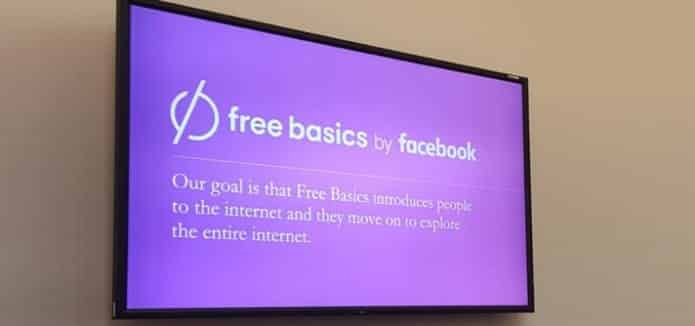The ‘free’ in Facebook’s Free Basics comes at a price and it is not a free Internet
Facebook is the only Internet firm to support telecom operators over the issue of differential pricing of data services amidst debate over net neutrality principles. However, it seems that something has been lost in translation between Facebook and those who reason to protect Internet neutrality for the masses in the vast country of India.
Free Basics, previously known as Internet.org, is a Facebook operation where by partnering with local telecoms firms in the developing world the firm offers free internet access to users who cannot afford a broadband connection or smartphone data plan. Also, the offer is limited only to Facebook, Facebook-owned WhatsApp, and a few other carefully selected sites and services.
Should Facebook’s Free Basics initiative be stopped immediately? A response to this question cannot depend on claims of its promoter, Facebook or its goal nor its critic. It is whether there is any evidence that Free Basics violates any existing rule, harms consumers or other players in the market. According to Telecom Regulatory Authority of India (TRAI), an economic regulator thinks that Facebook is gaining an unfair advantage to trade over the Indian population.
The Free Basics service provides useful Websites on health, travel, jobs and local government free of charge. By offering a limited number of Websites and services, and sending as little data as possible, costs are minimized for Facebook.
Naturally, Facebook is one of the apps included in the service. Others are Ask.com, Baby Center, Bing, Dictionary.com,Wikipedia and AccuWeather, among others.
While the debate continues whether telecoms operators should be allowed to offer different services with variable pricing, or whether a principle of network neutrality should be enforced, Facebook is not wasting time to wait for a judgement.
Facebook has gone ahead and spent in the range of Rs. 180-200 crores on print ads, which it claims is most for any medium. The recent weeks has seen Facebook running full-page advertisements in multiple newspapers urging people to support its Free Basics campaign. However, it’s worth noting that Facebook has not refuted or supported any claims of the money it has spent on ad campaigns for Free Basics in India.
A Facebook spokesperson in an emailed statement told Live Mint, “We’re aiming to get the facts out to as many people as possible, whether they’re connected today or will be in the future.”
Zuckerberg goes one step further, who in his Times piece said that those who are opposing Free Basics are actually hurting the poor.
He argued that “for every ten people connected to the internet, roughly one is lifted out of poverty”. Without reference to supporting research, he instead offers an anecdote about a farmer called Ganesh from Maharashtra state. Ganesh apparently used Free Basics to double his crop yields and get a better deal for his crops.
Zuckerberg stressed that “critics of free basic internet services should remember that everything we’re doing is about serving people like Ganesh. This isn’t about Facebook’s commercial interests”.
However, critics say that Free Basics violates some of the core elements of net neutrality, which mandate that all Internet content and users should be treated equally.
Mahesh Murthy, a Indian venture capitalist, told CNN that “what Facebook wants is our less fortunate brothers and sisters to be able to poke each other and play Candy Crush, but not be able to look up a fact on Google, or learn something on Khan Academy or sell their produce on a commodity market or even search for a job.”
Facebook CEO Mark Zuckerberg has defended the service against critics, arguing that the platform is open to all software developers, has no advertisements and will help less fortunate users escape poverty.
“Instead of wanting to give people access to some basic Internet services for free, critics of the program continue to spread false claims—even if that means leaving behind a billion people,” Zuckerberg wrote in an op-ed column in the Times of India. “Who could possibly be against this?”
The service is claimed to be open to any app, site or service, in practice the submission guidelines forbid JavaScript, video, large images, and Flash, and effectively rule out secure connections using HTTPS. This means that Free Basics is able to read all data passing through the platform. The same rules don’t apply to Facebook itself, ensuring that it can be the only social network, and (Facebook-owned) WhatsApp the only messaging service, provided.
Instituted in 2013, Free Basics (Internet.org earlier) was supposed to be a great way for people living in remote areas where Internet connectivity is not readily available. But last May, a collective of 65 advocacy organizations from 31 countries released an open letter arguing that it was not serving its purpose and actually violates the core tenets of a free and open Internet. That’s when the first wave of protest began.
Last month, the TRAI had floated a consultation paper on differential data pricing, with the last date for comments on December 30 and for counter comments on January 7. Shortly after, Facebook launched its Save Free Basics campaign urging users to send pre-written response to TRAI on the paper. The company also started an email-based campaign recently.
TRAI has received a record 2.4 million comments on the paper.
Recently, a survey firm recently claimed that a whopping 81 percent in a survey of 30,000 people had voted against Free Basics or any such programme and wanted an unbiased or neutral Internet for them. The survey was conducted by citizen engagement platform LocalCircles.
Other critics of Free Basics have been pushing the TRAI, posting about 500,000 comments about “saving the Internet” generated in various forums. TRAI is expected to announce its official position on differential Internet pricing in a few weeks.

